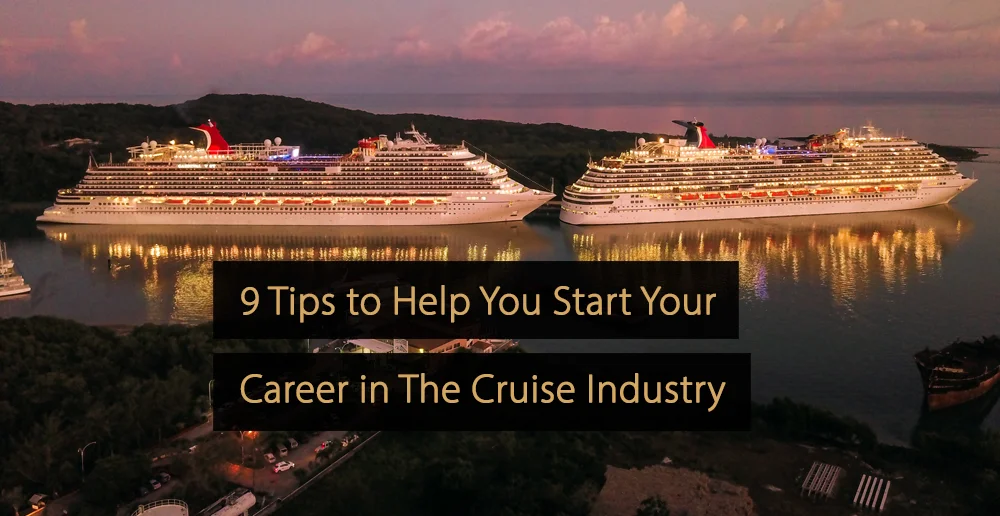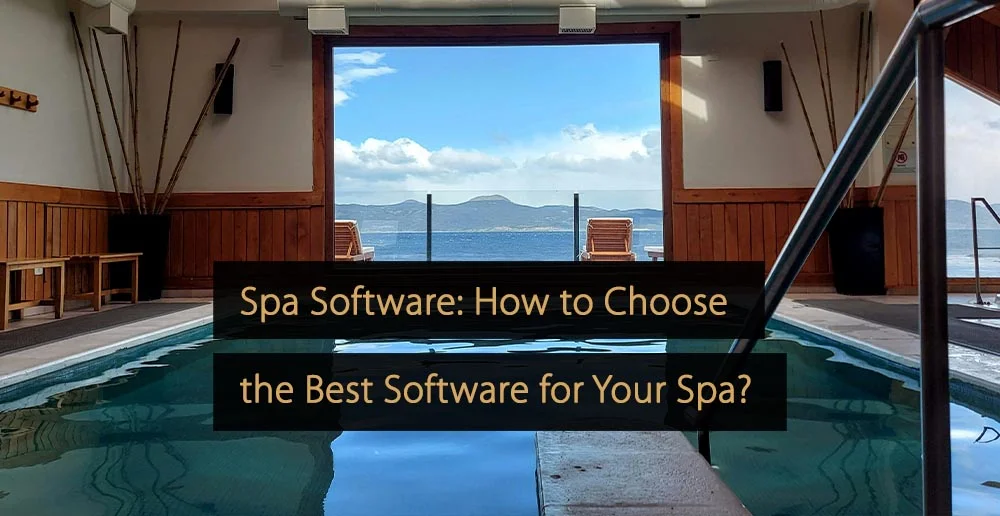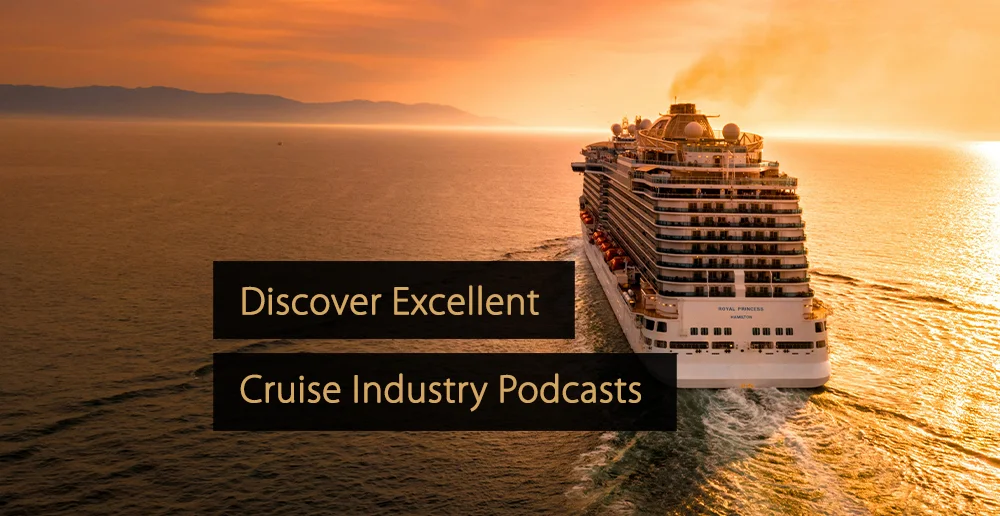Working on cruise ships can provide you with an exciting, varied, rewarding, and challenging lifestyle, which is why cruise careers are so popular with people specialized in all kinds of fields. To get started in such a role, however, you may need to take certain steps to obtain the right education and training and actually pinpoint relevant opportunities. In this article, you will learn more and access nine useful tips.
Table of Contents:
- Cruise Careers: 9 Tips to Help You Start Your Career
- 1. Start Your Cruise Career With the Right Training and Education
- 2. Make Yourself Stand Out With an Amazing CV
- 3. Adopt Personal Branding to Boost Your Cruise Career
- 4. Use Cruise Job Boards to Identify Your Next Cruise Career Move
- 5. Make Intelligent Use of LinkedIn for Your Cruise Career
- 6. Seek Out Support From Cruise Careers Recruitment Agencies
- 7. Prepare Properly for Your Cruise Industry Job Interview
- 8. Make Sure You Perform During the Interview Itself
- 9. Capitalize on Networking Opportunities During Your Cruise Career
- Apply for Cruise Jobs Through Cruise Line Websites
- The Best Websites for Finding Cruise Ship Jobs Online
- An Overview of the Different Cruise Industry Jobs
- All You Need to Learn About the Cruise Industry
Cruise Careers: 9 Tips to Help You Start Your Career
Although cruise careers are available to suit most tastes, skill sets, and levels of experience, it can be difficult to know how to get started. Below, you will find nine tips designed to give you the best chance of getting your foot in the door with a cruise line and beginning a successful career in the industry.
1. Start Your Cruise Career With the Right Training and Education
The first step when pursuing cruise careers is to ensure you have the right level of education and training for the role you are interested in. This is especially true with jobs that are higher up on a company hierarchy, such as a management position or a more technical role that requires specific knowledge or skills.
For example, as with other similar hospitality careers, if you want to work within the field of cruise management, you may need to have a degree in a related field, such as business management or even cruise management. You are also likely to need significant industry experience and have to have completed the right training.
Of course, it is worth highlighting that cruise careers also provide plenty of opportunities to begin in an entry-level job and then work your way up the career ladder. Many companies will invest heavily in training and may even help you obtain academic qualifications if you show that you have the right attributes and attitude.
2. Make Yourself Stand Out With an Amazing CV
The next thing to focus on when starting your cruise career is creating a strong CV, which employers cannot easily overlook. A good starting point here is to look for examples of some strong CVs in the cruise industry or from those in travel and tourism careers and identify some of the most common features.
You must avoid using a generic CV and instead create a tailored CV for each role you apply for. The best way to do this is to read through the job description and person specification, pick out some keywords and then try to include some of these in your CV. You should also emphasize relevant skills and experience throughout.
Try to keep your CV reasonably short and concise, and make sure you run a spell check before submitting it. When possible, try to refer to things in the terms the company you are applying for uses. So, for example, if they talk about a cruise master instead of a cruise captain, you should use this terminology too.
3. Adopt Personal Branding to Boost Your Cruise Career
Personal branding involves deploying techniques typically associated with brand marketing to enhance your personal reputation. Many cruise careers rely heavily on personal branding, to attract interest from employers, and so this aspect of career management should not be overlooked.
However, even on a basic level, almost every employer in the industry will carry out a background check on candidates they are interested in. Your personal branding strategy can significantly influence what information they see when they carry out a Google search and how that information comes across to them.
Make sure you use social media platforms like LinkedIn, Facebook, and Twitter wisely and avoid any issues where publicly accessible accounts present you in a less-than-favorable light. You can further enhance your personal branding efforts by registering your first and last name as a domain name using: https://about.me/.
4. Use Cruise Job Boards to Identify Your Next Cruise Career Move
Regarding seeking out vacancies to apply for, job boards are likely to be one of your most-used channels. In particular, several online job boards specialize in advertising jobs related to the travel and tourism industry, including cruise careers, and these platforms allow you to apply for multiple jobs quickly.
Check out the “Travel Jobs: The Best Travel Industry Job Boards for Your Career” article, where you can find a section covering some of the biggest and best job boards advertising cruise careers.
5. Make Intelligent Use of LinkedIn for Your Cruise Career
LinkedIn is one of the most valuable platforms you can use to find work, which is true when exploring cruise careers too. The ‘Jobs‘ sub-section of the website provides search options, so you can easily narrow your search to relevant cruise industry jobs in locations you are willing to work and then apply for those jobs online.
In addition, you can also use LinkedIn to develop a personal network of cruise industry contacts. You can share information on the platform about your job search and form give-and-take relationships with people. This may result in you being alerted to relevant vacancies, including some that may not be advertised elsewhere.
6. Seek Out Support From Cruise Careers Recruitment Agencies
Recruitment agencies assist employers with finding suitable candidates to fill any vacancies that may arise. Still, recruitment agencies can also assist job seekers in several key ways. For instance, many recruitment agencies specialize in a particular field, which is certainly true of agencies linking candidates to cruise careers.
The major benefit of working with a recruitment agency is they will possess a detailed knowledge of the sector and understand precisely what employers want from candidates. Many agencies have worked with the same employers for years, and they can help steer you in the right direction when optimizing your CV or your application.
7. Prepare Properly for Your Cruise Industry Job Interview
As with other travel careers, landing a job within the cruise industry is likely to require you to succeed in an interview, and the best way to ensure this happens is to take the necessary steps to prepare. This means researching the cruise company you hope to work for and finding out as much as possible about the role.
It also means taking the time to practice some of the common interview questions. Develop some basic template answers, which you can then fall back on during the interview. You should also take the time to prepare for the interview day by making sure you have something to wear and by planning your route to the venue.
8. Make Sure You Perform During the Interview Itself
With the preparation over, you need to ensure you perform well on the interview day. Make sure you get enough sleep the night before, and make sure you arrive at the venue slightly early. Dress appropriately for the job you are interviewing for and in accordance with any instructions you may have been given.
In the interview, make sure your phone is switched off, stay as calm as possible, and adopt positive, open body language. Do your best to maintain eye contact as much as possible, and take your time to answer questions properly. Making multiple copies of your CV with you to refer back to is a good idea.
9. Capitalize on Networking Opportunities During Your Cruise Career
Finally, professional networking is often crucial in the most successful cruise careers, so you should do your best to capitalize on this. Networking opportunities can be broadly broken down into online and offline networking, and for the best results, you should try to make the most of both options.
Online networking often takes place on social networks like LinkedIn, or even Facebook and Twitter. Reach out to other people in the industry and follow cruise companies. Ask questions, discuss your career and aspirations, and try to help others. Connecting with people this way can help open up new doors for you.
Offline networking can be further broken down into informal and formal networking. Informal networking consists of casual conversations, chance encounters, and other situations where you may informally discuss your career. On the other hand, formal networking involves deliberately attempting to network, such as by attending industry events.
Apply for Cruise Jobs Through Cruise Line Websites
When applying for cruise careers, cruise line websites will likely be among the first places you look. After all, most companies will have a ‘Careers‘ section on their site, listing current vacancies. However, to do this effectively, you must build up a list of some main cruise lines to explore.
Check out the “Cruise Jobs: Apply Directly For a Job at the Best Cruise Lines” post for a breakdown of some of the biggest employers in the industry, so you can check their websites regularly and find your ideal job.
The Best Websites for Finding Cruise Ship Jobs Online
Aside from turning to individual cruise company websites, several other websites can be useful in helping with your job search. For example, job boards and recruitment agency websites can make finding and applying for roles quick and easy, while social media platforms may also advertise vacancies.
Read the “Cruise Ship Jobs: List of Websites to Find The Best Job Vacancies!” article for a more in-depth look at some of the best websites to turn to, broken down according to these different website types.
An Overview of the Different Cruise Industry Jobs
It is worth stressing that a wide range of different cruise careers are available to you. This variety means there is likely to be a role that suits almost anyone, regardless of their experience, which aspect of the industry they are interested in, and what level of academic study they have reached.
Take a look at “Cruise Industry Jobs: An Overview of All Cruise Ship Positions” for much more information on the different job roles that exist, along with a description of what working in each of these positions actually entails.
All You Need to Learn About the Cruise Industry
Before embarking upon your cruise career, it is sensible to try and learn as much as you can about the industry itself. This means discovering the different types of cruise lines and the biggest examples of companies within those categories. It also means understanding the various cruise types and how they are defined.
Read “Cruise Industry: All You Need to Know About Cruises!” for more on these key areas of interest and additional information on cruise bookings, cruise technology, and revenue management within cruise companies.
Getting started with cruise careers does not need to be especially complicated. This career path offers excellent long-term prospects, even if you are not starting out with significant academic qualifications. If you follow the tips provided, you should be able to begin your career in the cruise industry relatively quickly.
More Tips to Grow Your Business
Revfine.com is the leading knowledge platform for the hospitality and travel industry. Professionals use our insights, strategies, and actionable tips to get inspired, optimize revenue, innovate processes, and improve customer experience.Explore expert advice on management, marketing, revenue management, operations, software, and technology in our dedicated Hotel, Hospitality, and Travel & Tourism categories.
This article is written by:
Hi, I am Martijn Barten, founder of Revfine.com. With 20 years of experience in the hospitality industry, I specialize in optimizing revenue by combining revenue management with marketing strategies. I have successfully developed, implemented, and managed revenue management and marketing strategies for individual properties and multi-property portfolios.









Leave A Comment